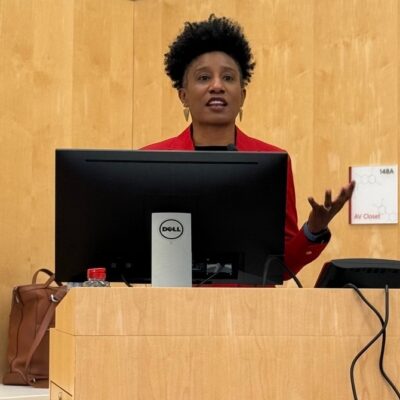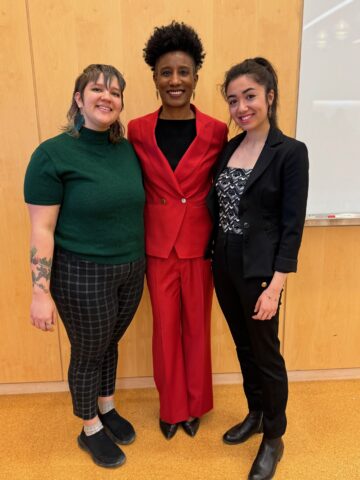Griffin: Acknowledge Identity for Stronger Mentoring Relationships

March 25, 2024
By Katya Hrichak
If you want to build a strong mentoring partnership, don’t discount the importance of bringing identity into the conversation, says Kimberly Griffin.
Griffin, dean of the College of Education and professor of higher education at the University of Maryland, presented the 2024 MAC Public Keynote on Feb. 29, tilted, “Equity-Minded Mentorship—Why and How Identity Matters.”
“Mentorship is an integration, for me, of career development, academic development, and psychosocial commitment,” she said. “It is not a mentoring relationship, in my mind, unless there’s a sense of caring between two people.”
While advisors can also be mentors, it is common that different individuals inhabit these roles, Griffin said. The advisor-advisee relationship is often focused on specific tasks leading to the attainment of a goal, while the mentor-mentee relationship is not unique to one system or target accomplishment and is characterized by a relationship quality that benefits both the mentor and the mentee.
Griffin’s research reveals that making space for identity in these relationships helps set mentors and mentees up for success.
In identity-absent mentoring relationships, mentors commit to treating everyone the same regardless of their many varied identities in an attempt to mitigate potential bias. This approach may unintentionally worsen inequality and leave mentees feeling less trusting and unable to bring their full selves to the relationship.
“We make more mistakes when we choose to ignore identity,” Griffin said.
Identity-based relationships tend to do the opposite, by recognizing and embracing shared identities. But this, too, has its limitations, as shared identities are not always enough to create a strong partnership.
Equity-minded mentoring relationships, which acknowledge identity without centering solely on identity, are the most productive, she found.
“You acknowledge the importance of identity, it’s there, but it’s not the only thing that’s going to drive how you connect with somebody else,” she said.
Equity-minded mentorship makes space for individual identities but also allows mentors and mentees to connect across many points of commonality, extending to and beyond characteristics of identity. This type of mentorship is a best practice Griffin recommends in all mentor-mentee relationships.
“I really appreciated hearing her advice, especially as a senior grad student closing in on graduation and hoping to be in a position to mentor others now and in the future,” said Annika Salzberg, a doctoral student in entomology. “The biggest lesson I took away was that empathy is the key to any good relationship, and going into mentor-mentee relationships with openness, honesty, care, and a willingness to learn is the necessary foundation for a fruitful professional relationship.”

Helen Stec, a doctoral student in neurobiology and MAC Peer Mentoring Program co-chair, appreciated how Griffin addressed the many kinds of identity-based mentorship and the ways in which they can shape the future of mentoring.
This was an important takeaway for Ria Gualano, a doctoral student in communication and MAC Peer Mentoring Program co-chair, too. The holistic approach to getting to know a mentee and what they need from the relationship will be useful to bring back to those involved in the program, she said.
“It’ll be helpful for us to disseminate this information to our organization, because there are a lot of really talented, committed mentors who want to cultivate the best mentoring relationship possible with the students they’re working with,” Gualano said. “I appreciated being in the room and getting to experience this.”
The annual MAC Public Keynote on Mentoring within the Academy provides the Cornell community an opportunity to learn about mentoring practices, academic culture, climate, and belonging within graduate education and the professoriate from nationally recognized scholar-practitioners. A recording of this year’s talk is available to those with a Cornell NetID.
This year’s keynote was sponsored by the MAC (Multicultural Academic Council) Peer Mentoring Program in collaboration with the Graduate School Office of Inclusion and Student Engagement and Future Faculty and Academic Careers Program.
